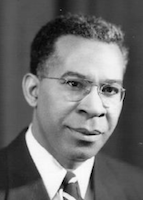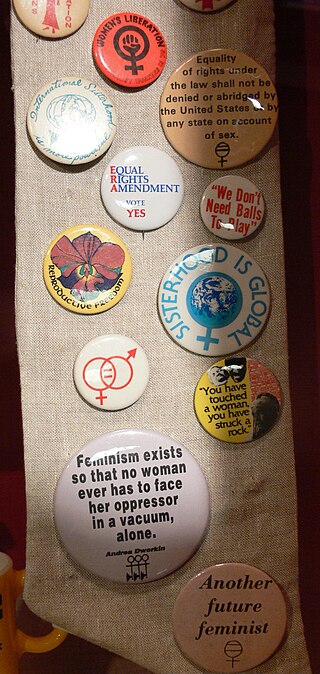Related Research Articles
Triple oppression, also called double jeopardy, Jane Crow, or triple exploitation, is a theory developed by black socialists in the United States, such as Claudia Jones. The theory states that a connection exists between various types of oppression, specifically classism, racism, and sexism. It hypothesizes that all three types of oppression need to be overcome at once.
Identity politics is politics based on a particular identity, such as race, nationality, religion, gender, sexual orientation, social background, caste, and social class. The term could also encompass other social phenomena which are not commonly understood as exemplifying identity politics, such as governmental migration policy that regulates mobility based on identities, or far-right nationalist agendas of exclusion of national or ethnic others. For this reason, Kurzwelly, Pérez and Spiegel, who discuss several possible definitions of the term, argue that it is an analytically imprecise concept.
Postcolonial feminism is a form of feminism that developed as a response to feminism focusing solely on the experiences of women in Western cultures and former colonies. Postcolonial feminism seeks to account for the way that racism and the long-lasting political, economic, and cultural effects of colonialism affect non-white, non-Western women in the postcolonial world. Postcolonial feminism originated in the 1980s as a critique of feminist theorists in developed countries pointing out the universalizing tendencies of mainstream feminist ideas and argues that women living in non-Western countries are misrepresented.
Marxist feminism is a philosophical variant of feminism that incorporates and extends Marxist theory. Marxist feminism analyzes the ways in which women are exploited through capitalism and the individual ownership of private property. According to Marxist feminists, women's liberation can only be achieved by dismantling the capitalist systems in which they contend much of women's labor is uncompensated. Marxist feminists extend traditional Marxist analysis by applying it to unpaid domestic labor and sex relations.
Socialist feminism rose in the 1960s and 1970s as an offshoot of the feminist movement and New Left that focuses upon the interconnectivity of the patriarchy and capitalism. However, the ways in which women's private, domestic, and public roles in society has been conceptualized, or thought about, can be traced back to Mary Wollstonecraft's A Vindication of the Rights of Woman (1792) and William Thompson's utopian socialist work in the 1800s. Ideas about overcoming the patriarchy by coming together in female groups to talk about personal problems stem from Carol Hanisch. This was done in an essay in 1969 which later coined the term 'the personal is political.' This was also the time that second wave feminism started to surface which is really when socialist feminism kicked off. Socialist feminists argue that liberation can only be achieved by working to end both the economic and cultural sources of women's oppression.
The matrix of domination or matrix of oppression is a sociological paradigm that explains issues of oppression that deal with race, class, and gender, which, though recognized as different social classifications, are all interconnected. Other forms of classification, such as sexual orientation, religion, or age, apply to this theory as well. Patricia Hill Collins is credited with introducing the theory in her work entitled Black Feminist Thought: Knowledge, Consciousness, and the Politics of Empowerment. As the term implies, there are many different ways one might experience domination, facing many different challenges in which one obstacle, such as race, may overlap with other sociological features. Characteristics such as race, age, and sex, may intersectionally affect an individual in extremely different ways, in such simple cases as varying geography, socioeconomic status, or simply throughout time. Other scholars such as Kimberlé Crenshaw's Mapping the Margins: Intersectionality, Identity Politics, and Violence against Women of Color are credited with expanding Collins' work. The matrix of domination is a way for people to acknowledge their privileges in society. How one is able to interact, what social groups one is in, and the networks one establishes are all based on different interconnected classifications.
Materialist feminism, as a discipline, studies patriarchy in terms of material sexual and economic benefits afforded to men at the expense of women through the mechanism and construction of gender. As a movement, materalist feminism is a part of radical feminism, thus founded for the abolition of patriarchy, mainly in France and Italy.

Intersectionality is an analytical framework for understanding how individuals' various social and political identities result in unique combinations of discrimination and privilege. Intersectionality identifies multiple factors of advantage and disadvantage. Examples of these factors include gender, caste, sex, race, ethnicity, class, sexuality, religion, disability, weight, species and physical appearance. These intersecting and overlapping social identities may be both empowering and oppressing. However, little good-quality quantitative research has been done to support or undermine the theory of intersectionality.
Black feminism, also known as Afro-feminism chiefly outside the United States, is a branch of feminism that focuses on the African-American woman's experiences and recognizes the intersectionality of racism and sexism. Black feminism also acknowledges the additional marginalization faced by black women due to their social identity.

Oliver Cromwell Cox was a Trinidadian-American sociologist. Cox was often misconceived as a Marxist due to his focus on class conflict and capitalism, however, Cox fundamentally disagreed with Marx's analysis of Capitalism. While Marx and other classical economists viewed foreign trade as trade in surpluses, Cox felt that foreign trade was the primary driving force in capitalist development. For Cox, capitalist systems were not isolated, but rather there was an interconnected network of global capitalist systems.
The Combahee River Collective (CRC) ( kəm-BEE) was a Black feminist lesbian socialist organization active in Boston, Massachusetts from 1974 to 1980. The Collective argued that both the white feminist movement and the Civil Rights Movement were not addressing their particular needs as Black women and more specifically as Black lesbians. Racism was present in the mainstream feminist movement, while Delaney and Manditch-Prottas argue that much of the Civil Rights Movement had a sexist and homophobic reputation.
In feminist theory, kyriarchy is a social system or set of connecting social systems built around domination, oppression, and submission. The word was coined by Elisabeth Schüssler Fiorenza in 1992 to describe her theory of interconnected, interacting, and self-extending systems of domination and submission, in which a single individual might be oppressed in some relationships and privileged in others. It is an intersectional extension of the idea of patriarchy beyond gender. Kyriarchy encompasses sexism, racism, ableism, ageism, antisemitism, Islamophobia, anti-Catholicism, homophobia, transphobia, classism, xenophobia, economic injustice, the prison-industrial complex, colonialism, militarism, ethnocentrism, speciesism, linguicism and other forms of dominating hierarchies in which the subordination of one person or group to another is internalized and institutionalized.

A variety of movements of feminist ideology have developed over the years. They vary in goals, strategies, and affiliations. They often overlap, and some feminists identify themselves with several branches of feminist thought.
Race relations is a sociological concept that emerged in Chicago in connection with the work of sociologist Robert E. Park and the Chicago race riot of 1919. Race relations designates a paradigm or field in sociology and a legal concept in the United Kingdom. As a sociological field, race relations attempts to explain how racial groups relate to each other. These relations vary depending on historical, social, and cultural context. The term is used in a generic way to designate race related interactions, dynamics, and issues.
Feminist pedagogy is a pedagogical framework grounded in feminist theory. It embraces a set of epistemological theories, teaching strategies, approaches to content, classroom practices, and teacher-student relationships. Feminist pedagogy, along with other kinds of progressive and critical pedagogy, considers knowledge to be socially constructed.
Multiple jeopardy is the theory that the various factors of one's identity that lead to discrimination or oppression, such as gender, class, or race, have a multiplicative effect on the discrimination that person experiences. The term was coined by Dr. Deborah K. King in 1988 to account for the limitations of the double or triple jeopardy models of discrimination, which assert that every unique prejudice has an individual effect on one's status, and that the discrimination one experiences is the additive result of all of these prejudices. Under the model of multiple jeopardy, it is instead believed that these prejudices are interdependent and have a multiplicative relationship; for this reason, the "multiple" in its name refers not only to the various forms of prejudices that factor into one's discrimination but also to the relationship between these prejudices. King used the term in relation to multiple consciousness, or the ability of a victim of multiple forms of discrimination to perceive how those forms work together, to support the validity of the black feminist and other intersectional causes.
Multiracial feminist theory is promoted by women of color (WOC), including Black, Latina, Asian, Native American, and anti-racist white women. In 1996, Maxine Baca Zinn and Bonnie Thornton Dill wrote “Theorizing Difference from Multiracial Feminism," a piece emphasizing intersectionality and the application of intersectional analysis within feminist discourse.

Racial capitalism is a concept reframing the history of capitalism as grounded in the extraction of social and economic value from people of marginalized racial identities, typically from Black people. It was described by Cedric J. Robinson in his book Black Marxism: The Making of the Black Radical Tradition, published in 1983, which, in contrast to both his predecessors and successors, theorized that all capitalism is inherently racial capitalism, and racialism is present in all layers of capitalism's socioeconomic stratification. Jodi Melamed has summarized the concept, explaining that capitalism "can only accumulate by producing and moving through relations of severe inequality among human groups", and therefore, for capitalism to survive, it must exploit and prey upon the "unequal differentiation of human value."
Feminism and racism are highly intertwined concepts in intersectional theory, focusing on the ways in which women of color in the Western World experience both sexism and racism.

Black Marxism: The Making of the Black Radical Tradition, first published in 1983, again in 2000 and a third edition in 2020, is a book written by the scholar Cedric Robinson. Influenced by many African-American and Black economists and radical thinkers of the 19th century, Robinson creates a historical-critical analysis of Marxism and the Eurocentric tradition from which it evolved. The book does not build from nor reiterate Marxist thought, but rather introduces racial analysis to the Marxist tradition.
References
- 1 2 Reed, Adolph (2020-05-14). "Socialism and the Argument against Race Reductionism". New Labor Forum. 29 (2): 36–43. doi:10.1177/1095796020913869. ISSN 1095-7960. S2CID 219429466.
- 1 2 Cunningham, Frank (1986-07-01). "Marxism and Class Reductionism". Philosophie et Culture: Actes du XVIIe congrès mondial de philosophie. 1: 267–287. doi:10.5840/wcp171986138. ISBN 2-920449-10-9.
- ↑ Cox, Ronald W. (2020). "A Left Critique of Class Reductionism". Class, Race and Corporate Power. 8 (2). doi: 10.25148/CRCP.8.2.009645 . ISSN 2330-6297. JSTOR 48644424. S2CID 244611771.
- ↑ Allahar, Anton L. (2014-09-02). "Marxist or not? Oliver Cromwell Cox on capitalism and class versus "race"". Canadian Journal of Latin American and Caribbean Studies / Revue canadienne des études latino-américaines et caraïbes. 39 (3): 420–444. doi:10.1080/08263663.2014.1013289. ISSN 0826-3663. S2CID 146710362.
- ↑ Reed, Adolph. "The Myth of Class Reductionism". The New Republic. Retrieved 18 January 2023.